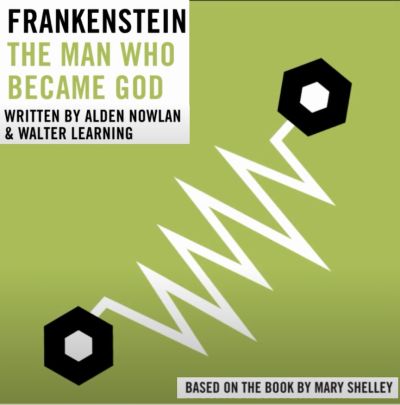More Than a Little Bit Crazy
Frankenstein, The Man Who Become God
By Alden Nowlan, Walter Learning & Mary Wollstonecraft Shelley

12 Jun, 2022
1975’s Frankenstein, The Man Who Become God was CBC Stage’s staging of Alden Nowlan and Walter Learning’s full-length adaptation of Mary Shelley’s Frankenstein. It is a restaging of Theatre New Brunswick’s production of the Nowlan/Learning adaptation. Lead actors were David Brown as the Creature, Neil Munro as Baron Frankenstein, Joan Gregson as Frankenstein’s doting fiancée Elizabeth Lavenza, David Renton as Henry Clerval (Frankenstein and Elizabeth’s friend).
Determined to make 1840 the year man conquers the North Pole, Captain Robert Walton refuses to allow minor setbacks like being locked in ice or the alarm of his increasingly mutinous crew deter him. The giant whose dog-drawn sled races by the trapped ship? Curious but surely of no relevance to Walton.
Three-quarters dead Baron Victor Frankenstein, on the other hand, is a man with whom Walton shares an important quality: hubris. Whereas Walton thus far is only risking his crew’s life, Frankenstein has left a trail of bodies behind him.
Paradoxically, the bloodshed began with Frankenstein’s determination to create life. Having verified that his technique reanimates creatures assembled from dead animals, Frankenstein turned his talents on humans. Success! With one small catch.
Although quite aware that his animal creations were hideous, the natural philosopher convinced himself that this would not be true of his glorious Creature. Confronted with the terrible truth, Frankenstein did the only thing a responsible scientist could do: reject his unfortunate creation, leaving it to survive or not as the fates would have it.
Frankenstein had provided the Creature with a brain of tremendous potential. A kindly blind man living in isolation provided the giant with an education. Despite this small comfort, the Creature was aware that he was a hideous figure with no hope of being welcomed into society. When the Creature finally learned the name of the man responsible — Frankenstein — the Creature resolved to force Frankenstein to pay for his actions.
The recompense the Creature demands is a wife. Frankenstein agrees to assemble a female Creature who, being as monstrous as the Creature, will have no choice but to be his companion in some wilderness isolation. On belatedly comprehending all the flaws in this simple plan, Frankenstein breaks his oath.
Enraged, the Creature sets to repay his Creator in blood. He will learn that success will not bring comfort.
~oOo~
What of Elizabeth Lavenza and Henry Clerval, you ask? They die. Everybody dies, at least everybody who knows Baron Frankenstein. By the end of the tale, only the Creature and his Creator are still alive, Frankenstein is dying of frostbite, and the Creature is determined to kill himself1.
I don’t recall how this came to be but my family had ready a tape machine with which to record this radio show when it was broadcast back in 1975. It was a family favourite. However, magnetic tape, like little Jackie Paper, does not live forever. Nor does CBC do a great job of making its archives available. I figured that I would never hear this childhood favourite again. I was very pleased to stumble over a copy a few weeks ago.
Even short books make for long plays. Accordingly, Nowlan and Learning, the authors of the play, streamlined the plot considerably. However, the play retains the essential elements, such as innocent parties being unjustly hanged for Creature-related deaths in large part because the melancholic, self-pitying Frankenstein cannot be bothered to intervene. Also, being close to Frankenstein is a death sentence.
David Brown as the Creature and Neil Munro as Baron Frankenstein have enormous fun chewing the scenery, competing to see which of them can be more lugubriously self-pitying as they strew carnage in their wakes. The Creature at least has some excuse: he’s very young, has had a traumatic upbringing, and he’s profoundly alienated2; nevertheless his emotional volatility is impressive, as he flips from ingratiating pleas to homicidal fury in the blink of an eye. There’s no excuse for Frankenstein, whose scientific prowess is married to no other virtues3. The other actors do their professional best, despite being upstaged by Brown and Munro. It’s all good fun, at least for the listener.
Frankenstein, The Man Who Become God is available here, at least until CBC notices and nukes it.
1: Michael Bishop’s Brittle Inningssuggests that the Creature ultimately rejected suicide in favour of …. But that would be telling.
2: The radio play leaves out the novel’s revelation that the Creature’s formative literary experience was The Sorrows of Young Werther, possibly due to time constraints or fear that the audience would not understand the significance of the novel.
3: Listeners may wonder why Henry and Elizabeth are so loyal to the Baron. Henry at least seems to hang around because he is hopelessly in love with Elizabeth, but what Elizabeth sees in her neglectful fiancé is unclear. Yes, he’s a Baron but surely there are Swiss barons not entangled in blood feuds with vengeful Creatures?
